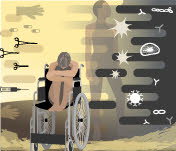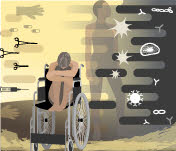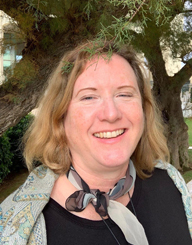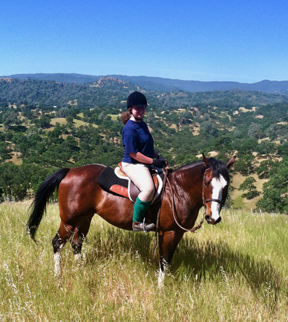
Lessons learned bug

Caroline Mitter was a veterinary student at the University of California, Davis, School of Veterinary medicine and a member of the Veterinary Information Network when she was diagnosed in 2014 with a rare, chronic disease called mitochondrial cytopathy. The subsequent five years saw her robbed of her ability to finish veterinary school, to walk, to eat and even to breathe without assistance. However, throughout that time, she trained her own service dog, moderated several Facebook groups and wrote poignantly of life with a chronic illness.
Days before her death in September 2019, Caroline asked a friend to help write a series of essays chronicling lessons learned from her disease. With help from Caroline's father, who was her medical advocate, Christy has drawn from memories and Caroline's own writing to create a four-part commentary. This essay is part of that series.
I never knew Caroline Mitter healthy. My first sight of her in 2014 was of a young woman in the powder-blue scrubs of a veterinary student, leaning heavily on a cane, legs twisting inward as she pulled herself up my steep driveway. I remember holding my breath but instinctively knowing help wasn't wanted.
That was the first of many afternoon teas and talks over a five-year journey through family and friendship, life and death, and through the bowels of the medical system.
Caroline was a veterinary student, originally scheduled to graduate in 2014 from the University of California, Davis, when she was beset by baffling and unremitting health issues. That was in 2013, at the beginning of her "first senior year." She took a hiatus from studies a couple of months into the school year, with the intent of joining the class behind hers the following fall.
Caroline Mitter 288

Photo courtesy of the Mitter family
Caroline Mitter, shown in 2010 before her mitochondrial disease symptoms started. Caroline's passions were people, food, animals and the outdoors.
Initially, she attributed her progressive muscle weakness to a spinal surgery some months before. In April 2014, she was hospitalized with severe muscle weakness and a sudden inability to walk. Later, the difficulty breathing began, and then the trouble digesting food.
In July 2014, as she should have been entering her chosen profession, Caroline posted this on her Facebook page:
So many emotions after being taken seriously by a doctor with the time and expertise to put all the pieces together and hearing news that was expected but not altogether good.
Dr. K said I probably have mitochondrial cytopathy, aka mito to those who know it too well. It's going to be a long, bumpy road, as mito is often progressive. ...
There's an odd relief in knowing the name of the dragon who shares my cave, though ...
On the fun-but-also-another-responsibility side, Dr. K agreed ... that it would be a good idea to get on the wait list for a service dog to help with balance while walking, picking things up when I'm in the wheelchair, etc. I'm going to start looking into program requirements now that I have a doctor to say yes, she could use a dog and has a long term problem. ...
Dr. Christy Corp-Minamiji 288

VIN News Service photo
The author, Dr. Christy Corp-Minamiji, met Caroline in 2014, the year Caroline had intended to join the veterinary profession.
At that point, Caroline and everyone in her life thought her illness would progress slowly; that she would need some accommodations but that her life and career could continue more or less as planned.
When Caroline and I met that afternoon in 2014, introduced by a mutual veterinary friend who was visiting from out-of-state, there didn’t seem to be any question that she would continue through school, albeit needing some accommodation, and pursue what was sure to be a brilliant career.
It didn't happen that way.
The subsequent five years, coincidentally the years of our friendship, were a journey into a medical and societal hellscape for Caroline and her family. The day she decided to refuse treatment for her final bout of sepsis, Caroline asked me to share pieces of her journey and the lessons learned along the way with others, particularly with those who were to have been her colleagues.
We thought, at that time, that this commentary could be written together, with me acting as her scribe. We didn't know she had only three days of life and only hours of lucidity remaining. I'm left pulling together the pieces of our conversations and of her writings, and as a witness.
Here are Caroline's story and lessons, beginning from the end:
John Muir Hospital, Walnut Creek, California, Sept. 23
"I know it's an odd choice …" my voice trailed off as I tried to mollify the clearly uncomfortable palliative care physician.
"It's a very odd choice," she snapped as she stared down at Caroline, her hand twitching toward the sheet, as if modesty was a concern anymore.
I wonder what she saw. I saw the pale, rash-riddled body of my dear friend, near comatose, pocked with the scars of past central intravenous lines, the tissue around her gastro-jejunal tube angry as always with inflammation. In her fever delirium, Caroline had torn off her gown (nearly extricating her last IV line in the process), and the sheet that seemed to so worry the doctor was flung off as quickly as it was replaced.
Caroline on horseback 288

Photo courtesy of the Mitter family
A lifelong rider who frequented equine and veterinary message boards using the name Eventualeventer, Caroline anticipated becoming an equine veterinarian. This photo from 2012 is one of the last taken of her on horseback.
I saw a body that had degenerated over the years of our friendship and drastically so over the past six months. I saw the body Caroline hated, trapped in yet another of innumerable hospital beds. I looked up and saw yet another white coat baffled by the young woman before her, and like so many of her colleagues, hostile in her bafflement.
"A 31-year-old woman does not just decide to die of sepsis."
Well, of course not, I thought, but it wasn't just sepsis. It never was. And this was the issue, every time, in every hospital. To them, Caroline was a presenting complaint. The presenting complaint of the moment.
Still, I wanted to give this last doc the benefit of the doubt. "Well, it's been over five years," I said, explaining that for three years of that time, she was totally TPN-dependent, meaning that she was receiving nutrition by IV, a system that's not meant to be used for more than a few weeks. For the last six months, I told the doctor, Caroline had almost no quality of life. "It's been basically an endless tour of the emergency rooms and ICUs of Northern California."
"I know that. I've got her record." The palliative care doctor sighed and stared at Caroline again. "Well, I've increased the hydromorphone a bit; there isn't much else we can do without suppressing her breathing."
I stifled a gallows laugh, thinking to myself that now was exactly the time for respiratory suppression. But I didn't laugh. Nor did I yell the words that I could almost see in a thought bubble over my head. "Aren't you a palliative care specialist? How can you be so confused by this?"
I knew the answer, though. She was merely the last in a five-year line of physicians who didn't grasp, couldn't grasp, or refused to see, the whole picture. They had all the pieces but they couldn't or wouldn't assemble the puzzle.
Caroline described her disease complex in an essay on Facebook roughly six months before her death:
Today is Rare Diseases Day. I have one rare disease, mitochondrial myopathy, that has led to several other rare diagnoses, such as gastroparesis (ineffective or absent motor function of the stomach) and mast cell activation disorder (MCAD), in which a particular line of immune cells freaks out and causes inappropriate allergic-type reactions in response to triggers. Since it's not a true allergy requiring an allergen to bind to a receptor, triggers can include heat, cold, pressure, etc.
My motility doc at Stanford thinks that MCAD secondary to the mito is contributing to my GI issues, and I actually need fewer doses of pain meds when I'm on regular Benadryl. MCAD can also cause anaphylactoid reactions, which look the same as anaphylaxis but have different triggers. Besides the GI tract, the skin is often affected. I have long had problems with adhesives needed to cover and secure my central line, including scratching unconsciously at night, which is a risk for infection and for the line coming out ...
For those who are new to mitochondrial disease, or mito, it is an energy metabolism disorder that occurs at the level of individual cells or tissues, interfering with the cells' ability to produce [energy] …
Nerd stuff aside, every cell in your body requires mitochondria for at least some part of their life cycle; mature red blood cells are the only ones that don't have any, but some of their precursor cells do. This means that you can get problems in any part of the body. I have problems with my muscles, GI system, adrenals, brain (migraine, tremors, possibly dystonia), skin due to MCAD, connective tissue, and more …
Not surprisingly, my mito causes overall profound fatigue in addition to dysfunction of specific organs. I'm extra tired this week because it seems that I'm having another bout of respiratory infection, either bronchitis or pneumonia. I never had any viral symptoms, just shortness of breath, cough, and much greater reliance on oxygen. We don't know what’s causing it, but I've started having issues of fatigue in my oral and facial muscles, such that it is harder when I'm tired or sick to move saliva back properly and then actually swallow it in a coordinated fashion. This may well be a bit of aspiration pneumonia and as my breathing and swallowing muscles get weaker, this will be more of a problem. There are some machines and strategies that can help with clearing secretions and stuff that I aspirate before they cause a problem, but they're tiring, too.
Time and again, in some of the most highly regarded hospitals in the region, if not the world, Caroline was told the same things "We'll fix this sepsis … this pulmonary embolism … this pneumonia … replace this line … this G-J tube … change your medications …" and the unspoken ending was "and you'll go home and be fine; the rest is all in your head."
There was a complex cycle at play, and despite the records and Caroline’s own eloquent explanations, the medical system appeared insistent on seeing only one piece at a time. The whole picture never seemed to matter.
Hence, lesson one: Patients are more than a collection of parts and problems. And each problem impacts the care required for the others.
Next: Pain kills
About the author: Dr. Christy Corp-Minamiji is a 1996 graduate of the University of California, Davis, School of Veterinary Medicine. She has practiced small animal medicine and large animal medicine, and worked in the biologics industry. Since 2011, she's worked for the Veterinary Information Network, in communications. Christy and Caroline became friends in 2014. Over the years of their friendship, they shared cupcakes and tea, tears and bad puns, and lots and lots of golden retriever hair. Christy wrote this commentary to honor one of Caroline's final wishes.